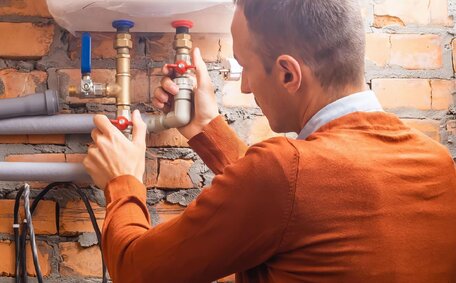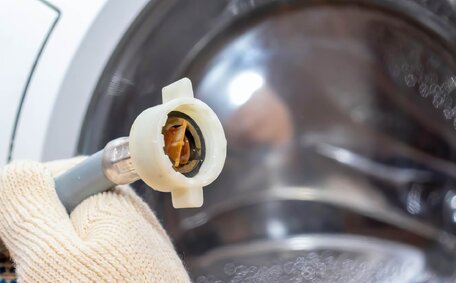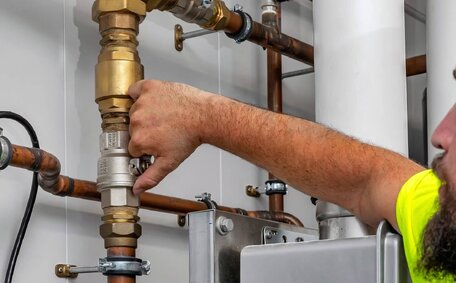The Issue of Fat, Oil, and Grease Building up in Kitchen Drains
In Saint Marys, a primary culprit for kitchen drain blockages is the accumulation of fats, oils, and grease (FOG).
Oil and grease from the kitchen slide down the sink and gradually coat the drain pipe walls. Pouring grease down the drain slowly clogs the interior pipes, reducing water flow and eventually leading to a full blockage.
Grease traps, designed to capture FOG before entering plumbing systems, can become overwhelmed by these substances.
Australian water authorities warn that FOG can compromise the sewer system, risking blocked sewers and costly repairs due to tree roots intruding into pipes.
Our team explains safe techniques like discarding used cooking oil grease into the trash to responsibly manage this type of waste instead of sending it down the drain. We provide advice on maintaining clear drains and managing the daunting clogs that can occur when FOG is inadvertently poured down drain.
How Pouring FOGs Down the Drain Leads to Drain Blockages Over Time
Disposing of small amounts of grease down your drain may seem harmless, but these deposits can lead to significant blockages. As hot FOG journeys through pipes, remember it cools and adheres to the interior surfaces, gradually creating blockages. Grease and fat in the pipes eventually solidify into accumulated thick layers, gradually constricting water flow.
This buildup narrows drain openings slowly, creating an obstruction inside pipe walls and impeding water flow. At one point, water ceases draining altogether from a kitchen sink clogged by grease, causing complete drain closure.
While FOG may initially flow smoothly, over time, it causes the drain to slow. Contrary to popular belief, boiling hot water poured after grease doesn’t eliminate FOG but instead pushes it further down the plumbing.
The simplest advice is not to pour grease fat or oils down your kitchen sink, thereby averting clogged disasters and contributing to cleaner waterways. While commercial kitchens use grease traps to intercept FOG, households must manage the disposal of grease and oil down your sink with care to ensure they don’t congregate in your plumbing system. Saint Marys homeowners can deter obstructive clogs by conscientiously keeping grease fat out of your drains and discarding FOG into trash bins instead. Then make their presence known if backups do occur for timely drain assessments and cleaning.
Preventing FOGs from Entering and Clogging Drains
Your kitchen sink is often the central point for household accumulation of FOG. It’s crucial to prevent grease accumulation, a leading cause of blocked drains. Our team recommends Saint Marys homeowners take these steps to prevent coffee grounds and food scraps from clogging drains:
- Install sink strainers to catch hair food particles, preventing them from amalgamating with fats oils grease. Regularly clean strainers to eliminate trapped debris.
- Collect the fats and oils from your food in containers designated for proper disposal. Reusing oil also minimises waste.
- Place paper towels in your dishes pans to absorb residual grease, oils, and fats, aiding in the prevention of soap scum build-up. Discard toilet paper or towels in the bin rather than flushing them down the toilet or rinsing them into sinks.
- Have a heart-to-heart with every member in your household about proper FOG disposal methods. Set clear guidelines to prevent inadvertent sink pouring.
- Consider installing a retrofit plumbing device such as a grease trap to intercept FOG before it impacts the drainage system. This device captures grease below the sink, averting drain line blockages.
- Commit to responsible FOG disposal habits. Preventing clog issues requires keeping fats, oils, and grease out of the drain lines.
These key steps aid in preventing kitchen drain blockages from oils and fats. Saint Marys homeowners can prevent grease from solidifying into obstructive gunk in drains. We are adept at troubleshooting backups with prompt drain assessments and cleanings should the need arise. But what should you glean from these tips? They will go a long way toward preventing clogs.
Proper Disposal Methods for Fats, Oils and Greases
Regarding the disposal of fats, oils, and greases (FOG) in your Saint Marys home, it’s vital to avoid pouring them down the drain or relying on the garbage disposal. Here is the best way and the recommended methods for safe FOG disposal:
- Wait for fats and oils to cool down and harden before attempting to dispose of them, ensuring safety. Hot oil poses a safety risk.
- Transfer cooled grease into an oil can, jar, or any container that can be sealed securely. Glass jars work great for storing hardened fats.
- Dispose of the sealed container in your rubbish bin, ensuring that no FOG enters the drain.
- Consider recycling options for how dispose of oil, rather than simply throwing it out. Some councils accept oil for biodiesel conversion programmes.
- You can add small amounts of cooked bacon grease to your compost bin, if available, instead of discarding it.
Improper disposal of fats, oils, and greases can lead to preventable clogs in your Saint Marys plumbing system. By following these safe practises, you can responsibly manage FOG waste rather than letting it build up into obstructions within your plumbing.
Remember that commercial-grade grease traps are required to intercept FOG waste in cafes and restaurants. In residential kitchens, it is incumbent upon homeowners to manage FOG disposal correctly, thus preventing drain blockages caused by fat. When in doubt on clogs or other kitchen plumbing issues, the Saint Marys Plumbing team is here to help.
Unclogging a Kitchen Sink Drain Clogged with Grease
Saint Marys residents can tackle minor kitchen sink clogs from grease with these simple steps:
- Start by pouring boiling water down the drain to melt the clogged grease. This helps melt grease, making its way down kitchen drain and causing buildup inside the sink drains.
- Follow up by pouring a mix of baking soda vinegar down the clogged sink. Let sit for 5 minutes.
- Pour 1⁄2 cup heated white vinegar down the drain and immediately cover opening with a plug. The resulting chemical reaction can help break down and dissolve grease.
- Allow the vinegar baking soda solution to sit for 10-15 minutes.
- Flush with a mix of vinegar hot water, not cold, for a minute or two.
- Employ a sink plunger over the drain opening to force the clog out your pipes by plunging vigorously in short bursts.
- Alternate between more hot water and plunging until drain is cleared.
Nevertheless, minor grease clogs can frequently recur, necessitating effective methods to eradicate these unwelcome blockages. For more significant blockages, professional assessment, hydro jetting, snaking, and thorough cleaning are necessary to return your kitchen plumbing to optimal function.
When to Call a Professional Plumber for Severely Blocked Drains
Severely blocked drains are often beyond the scope of do-it-yourself solutions. If you’re grappling with recurring clogs, water stagnation from slow drainage, or foul odours, reach out to your local plumbing experts for assistance.
Signs your Saint Marys home needs our professional drain cleaning services include:
- Water backs up or spills over from your bathroom sink and other drains, despite efforts with plunging or using a chemical drain cleaner.
- Bad odours emanating from drains often indicate a severe FOG buildup, which causes blocked drains or obstacles downstream in your plumbing.
- Blockages caused by congealed fat can result in sinks or tubs draining extremely slowly, sometimes taking hours to empty.
- Multiple drains throughout your home are sluggish or clogged at the same time.
- Previous plumbing repairs failed to resolve ongoing drain blockages.
At the first signs of serious drain trouble, contact our team at 1300 349 338 or [email protected]. Our licensed specialists use high-pressure water jets, mechanical drain snakes that safeguard your plumbing, and professional cleaning techniques to address clogged sewer pipes.
We offer professional inspections of sewer lines for recurring clogs. Comprehensive drain assessments help identify underlying issues contributing to obstructions unique to your Saint Marys home’s plumbing. Our skilled professionals will advise on how to effectively clear and prevent future blockages.
Do not delay addressing plumbing emergencies; seek professional services for unblocking kitchen, bathroom, or other household drains. Reach out to the most trusted drain cleaning professionals in Saint Marys and surrounding regions.
Educating Households on Drain Maintenance to Prevent Blockages
Proper care for kitchen sinks is crucial for avoiding clogs and prolonging plumbing system lifespan. We advise Saint Marys homeowners to adopt regular maintenance habits like using sink strainers, limiting grease pouring, and discarding food waste responsibly.
Households are advised to schedule regular drain inspections and professional hydro jetting for their hot water systems as a preventative measure. Over time, subtle drain issues can worsen unseen. Catching problems early keeps small plumbing concerns from becoming major disasters.
As Sydney’s premier local plumbing provider, Our licenced technicians have the high-powered equipment, drain cameras, and expertise to clean your pipe condition and catch troublesome clogs before they occur. We help homeowners map out affordable drain care plans tailored to their specific needs.
Don’t wait until major flooding or sewage backups happen to care for drains. Schedule preventative drain system maintenance by calling Saint Marys Plumbing today at 1300 349 338. With vigilant service routines, households can stay ahead of disruption and added costs.






